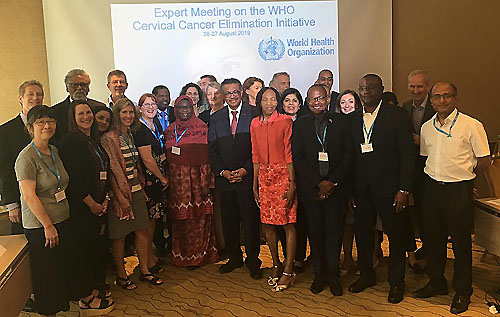Geneva – Dr Tedros Adhanom Ghebreyesus, WHO Director-General, convened for the first time a group of experts from 12 countries appointed for two years to contribute with their expertise towards the Draft Global Strategy to Eliminate Cervical Cancer as a public health problem. The Draft Strategy was requested by Member States at the January 2018 Executive Board. It will be discussed at the upcoming Executive Board in January 2020 and is expected to be presented at the 73rd World Health Assembly in May 2020 for approval by the Member States.

The two days deliberations covered various aspects of the Draft Strategy, including the key three targets on the percentage of vaccination, screening and diagnosis and treatment that countries need to reach by 2030, the Draft Strategy’s deadline, to put the world towards the path of elimination. The Draft Global Strategy is being developed in close consultation with Member States, through online consultations, with the support of the WHO regional offices, who have convened also regional meetings. In addition, there has been broad collaboration with UN Agencies and other partners and organizations, who have had the opportunity to participate through the open consultations.
Key points in the recommendations from the Expert Advisory Group address the comprehensive approach to cervical cancer prevention and control, spanning HPV-vaccination, diagnostics and technologies to support detection and treatment of pre-cancers of the cervix as well as access to treatment and palliative care of cervical cancer.
The experts also discussed priority topics for research as the world moves towards a goal of reducing the incidence and mortality of cervical cancer in all countries. In addition to aspects across the clinical, service delivery and social sciences spheres, they talked about cross-cutting issues. Examples of these are the need for integration across existing health programmes and beyond, the opportunity to strengthen and leverage primary health care as services scale up and address gender and social justice challenges as well as the need for partnerships to facilitate the national responses. The opportunity to both harness and drive innovation was considered key in achieving the 2030 targets laid out in the Draft Global Strategy. This was considered important in all countries, but especially in those with the highest burden - ensuring that no country is left behind.
The recommendations of this advisory group will complement the work of the Technical Working Groups spanning across the World Health Organization technical departments, who have led the development of the technical content in the Strategy over the past year.
The initiative to eliminate cervical cancer was launched by Dr Tedros with a call to action in May 2018. The experts were appointed in July this year by the WHO’s Director-General, after an open call and following a process of review and selection. During the two years their appointment last, they will provide expert advice as the Draft Global Strategy, once final and approved by the World Health Assembly, is put forward for implementation at the national level.
